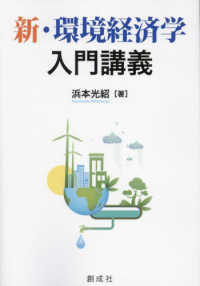- ホーム
- > 洋書
- > 英文書
- > History / World
Full Description
This book studies the Chinese imperial examination from the different perspectives. The first part opens with the centurial anniversary of the abolition of the examination system. The first chapter of this book serves to redress the injustice done to the imperial examination system and restore its historical truth on this very special occasion.
The second part discusses the inception of the imperial examination. It concentrates on the research of the start of the imperial examination in Sui and Tang dynasty. Sui and Tang Dynasty opened up the era of imperial examination system in Chinese history with Tang Dynasty as the inception of the system influencing the contents and organization of examinations and other examination tradition in Song. From Tang Dynasty, imperial examination hall named Ke Chan came into being, serving as a vital arena for social political activities and humanistic educational activities.
From then on, imperial examination occupies a decisive part in traditional Chinese social structure. As the inceptive and developing stage, the system in Tang dynasty showed great originality and vitality, diversity and volatility, thus becoming an era worth researching.
The achievements and defects of imperial examination system constitute the third part of the book. Imperial examination is the literary civil service exam in ancient China, yet it embodied properties of educational exams. It was the focus at the time and unable to be separated from ancient Chinese education. This chapter mainly probes into the achievements and defects of the imperial examination system, relationship between the system and ancient academy, the self-study nature of the system, the intelligence test and degree examination nature of the system.
The fourth part of the book inquiries into the influence of imperial examination culture. Cultural tradition and traditional culture are two eternal themes of academic researches. As an essential part of traditional Chinese culture, imperial examination and its culture are indispensable parts of culture research, for it reflects the main characteristics of the entire late Chinese imperialism. This chapter discusses the influence of imperial examination system on Chinese culture, the remnants of the system in modern China, with a focus on the system's spread to western and eastern countries. In addition, the details of theories of the formation of east Asian imperial examination cultural circle, and the system's spread to western countries constitute another part of the discussion.
Chinese Cultural Studies is now gaining popularity in the Western society. This book is an authoritative, thorough, complete and comprehensive study of Chinese Imperial Examination system. It is a must to understand Chinese culture, especially ancient China's examination system.
Contents
Preface
Chapter 1 Centurial Anniversary of Abolition of the Imperial Examination system Centurial Anniversary of Abolition of the Imperial Examination system
Redress Injustice Done to the System
Reevaluate the Imperial Examination System
End of Indiscriminate Condemnation on the System
Why the Imperial Examination System Calls for Redress
Clarify the Name for the System
Foreign Influence and the Abolition of the System
Abolition of the System and Cultural Conflicts
The Last Posted List of Jin Shi (the Highest Degree in the System)
Chapter 2 Inception of the Imperial Examination System
Paraphrase the Imperial Examination System and Its Inception Year
Establishment, Abolition and Name Evolvement of Xiu Cai Ke in Tang Dynasty
Analysis Of Jun Shi Qualification Exam in Tang Dynasty
Imperial Examination Qualifiers and Quanxuan Official Selecting System
Reanalyze Start of Name-concealing Grading System "Hu Ming" in Tang Dynasty
"Hanyu Disciples" and Mid-Tang Imperial Examination
Tang Dynasty Academies and Imperial Examinations Development
Confucian Classics v.s. Literature in Tang Dynasty Official Appointment
Imperial Examination Hall - Epitome of Millennial Imperial Examination
Chapter 3 Achievements and Defects of Imperial Examination Education
Relationship between Ancient Chinese Academy and Imperial Examination
Imperial Examination and Ancient Chinese Academy Study: Interaction and Mutual Reference
Pros and Cons of Imperial Examinations
Law of Imperial Examination Development
The Selection of Able Men and True Talents
Imperial Examination: Ancient China's Self-study Higher Education Examination
Imperial Examination's Nature as Intelligence Test
Validity of the Degree Conferring Examination Theory
Chapter 4 Influence of Imperial Examination System
Imperial Examination System's Influence on Chinese Culture
Imperial Examination Literature and Study of Imperial Examination
East Asian Imperial Examination Cultural Circle
Japan, Korea and Vietnam under the Influence of the System
New Evidence of Western Spread of the System
The Cause and Effect of the Western Spread Theory
Imperial Examination—the Fifth Great Invention of China
Zhuangyuan Cake Gambling -Unique Remnant of Imperial Examination Culture
From Zhuangyuan Chip to Hui Cake Gambling
Afterword








